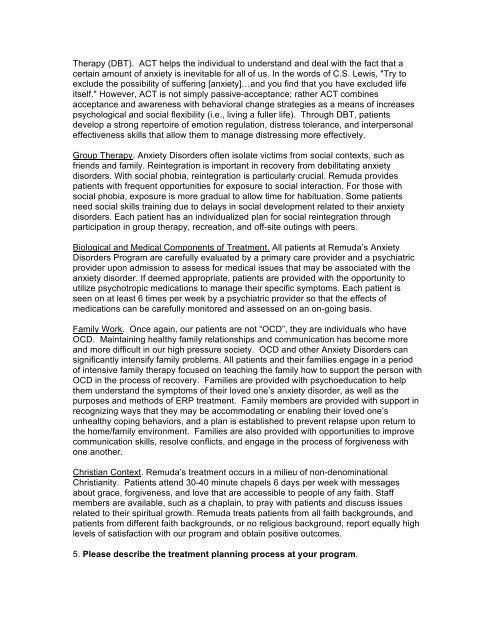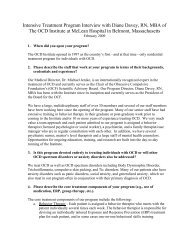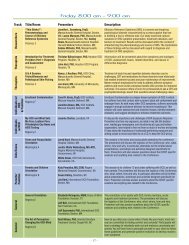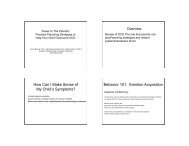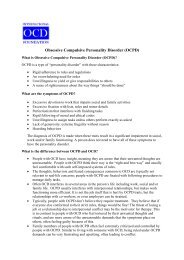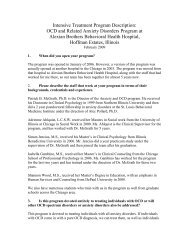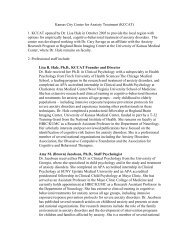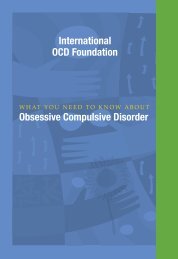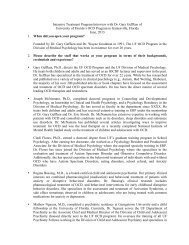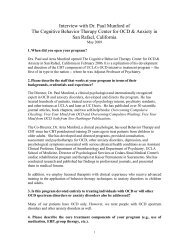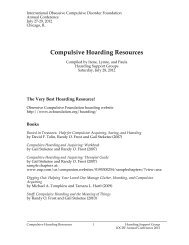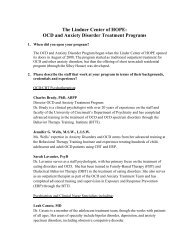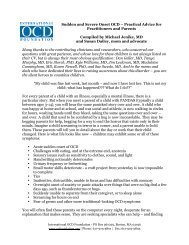When Did You Open Your Program? - Obsessive-Compulsive ...
When Did You Open Your Program? - Obsessive-Compulsive ...
When Did You Open Your Program? - Obsessive-Compulsive ...
You also want an ePaper? Increase the reach of your titles
YUMPU automatically turns print PDFs into web optimized ePapers that Google loves.
Therapy (DBT). ACT helps the individual to understand and deal with the fact that a<br />
certain amount of anxiety is inevitable for all of us. In the words of C.S. Lewis, "Try to<br />
exclude the possibility of suffering [anxiety]…and you find that you have excluded life<br />
itself." However, ACT is not simply passive-acceptance; rather ACT combines<br />
acceptance and awareness with behavioral change strategies as a means of increases<br />
psychological and social flexibility (i.e., living a fuller life). Through DBT, patients<br />
develop a strong repertoire of emotion regulation, distress tolerance, and interpersonal<br />
effectiveness skills that allow them to manage distressing more effectively.<br />
Group Therapy. Anxiety Disorders often isolate victims from social contexts, such as<br />
friends and family. Reintegration is important in recovery from debilitating anxiety<br />
disorders. With social phobia, reintegration is particularly crucial. Remuda provides<br />
patients with frequent opportunities for exposure to social interaction. For those with<br />
social phobia, exposure is more gradual to allow time for habituation. Some patients<br />
need social skills training due to delays in social development related to their anxiety<br />
disorders. Each patient has an individualized plan for social reintegration through<br />
participation in group therapy, recreation, and off-site outings with peers.<br />
Biological and Medical Components of Treatment. All patients at Remuda’s Anxiety<br />
Disorders <strong>Program</strong> are carefully evaluated by a primary care provider and a psychiatric<br />
provider upon admission to assess for medical issues that may be associated with the<br />
anxiety disorder. If deemed appropriate, patients are provided with the opportunity to<br />
utilize psychotropic medications to manage their specific symptoms. Each patient is<br />
seen on at least 6 times per week by a psychiatric provider so that the effects of<br />
medications can be carefully monitored and assessed on an on-going basis.<br />
Family Work. Once again, our patients are not “OCD”, they are individuals who have<br />
OCD. Maintaining healthy family relationships and communication has become more<br />
and more difficult in our high pressure society. OCD and other Anxiety Disorders can<br />
significantly intensify family problems. All patients and their families engage in a period<br />
of intensive family therapy focused on teaching the family how to support the person with<br />
OCD in the process of recovery. Families are provided with psychoeducation to help<br />
them understand the symptoms of their loved one’s anxiety disorder, as well as the<br />
purposes and methods of ERP treatment. Family members are provided with support in<br />
recognizing ways that they may be accommodating or enabling their loved one’s<br />
unhealthy coping behaviors, and a plan is established to prevent relapse upon return to<br />
the home/family environment. Families are also provided with opportunities to improve<br />
communication skills, resolve conflicts, and engage in the process of forgiveness with<br />
one another.<br />
Christian Context. Remuda’s treatment occurs in a milieu of non-denominational<br />
Christianity. Patients attend 30-40 minute chapels 6 days per week with messages<br />
about grace, forgiveness, and love that are accessible to people of any faith. Staff<br />
members are available, such as a chaplain, to pray with patients and discuss issues<br />
related to their spiritual growth. Remuda treats patients from all faith backgrounds, and<br />
patients from different faith backgrounds, or no religious background, report equally high<br />
levels of satisfaction with our program and obtain positive outcomes.<br />
5. Please describe the treatment planning process at your program.


